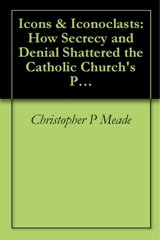|
Foster Heights Books 2010
 Christopher Meade
was ordained to the Catholic priesthood for the Hartford archdiocese in
1998. He served in various parishes in Connecticut, where he performed
numerous ministerial functions in diverse urban and suburban settings
until his resignation in 2007. His ministry included the celebration of
the sacred liturgy in English, Latin and Spanish, evangelization through
preaching, service to the sick in hospitals and convalescent homes,
spiritual counseling to the dying, managing parish staff, education of
children and adolescents in Catholic schools, and the education of
adults through parish programs. He holds a Bachelor of Arts from the
University of Connecticut, Master of Arts from Holy Apostles Seminary
and a Master of Divinity from Mount Saint Mary’s Seminary. Christopher Meade
was ordained to the Catholic priesthood for the Hartford archdiocese in
1998. He served in various parishes in Connecticut, where he performed
numerous ministerial functions in diverse urban and suburban settings
until his resignation in 2007. His ministry included the celebration of
the sacred liturgy in English, Latin and Spanish, evangelization through
preaching, service to the sick in hospitals and convalescent homes,
spiritual counseling to the dying, managing parish staff, education of
children and adolescents in Catholic schools, and the education of
adults through parish programs. He holds a Bachelor of Arts from the
University of Connecticut, Master of Arts from Holy Apostles Seminary
and a Master of Divinity from Mount Saint Mary’s Seminary.
After completing his studies at the
University of Connecticut and before entering seminary, Meade worked
with disabled adults in residential and vocational settings. He also
worked with troubled teens in a juvenile residential school.
Since 2007 he
served in the insurance and investment industry. He dedicated the year
2009 to writing and publishing Icons & Iconoclasts. He lives in
Connecticut.
How did the book come about?
“A friend who serves as a Catholic priest in Connecticut asked
[Meade] this question recently. Over the previous couple of years we had
drifted apart as our lives went in different directions. He was
surprised when I mentioned that I had written a book about the Church
from my perspective as a resigned priest. It is an excellent question,
and one that I would like to address. I attribute the genesis of the
book to four factors: to God's grace; the worldwide sexual abuse
scandal; to a very personal desire to communicate directly to my beloved
former parishioners; and to the hope that the Catholic Church will play
a more vibrant role in our contemporary world. Permit me to explain.
This is the spiritual part of how
the book came to be. The sacraments of baptism and priesthood opened a
door that allowed God's grace to enter into the depths of my soul. As a
priest, I was privileged to share that grace with others when I baptized
children, celebrated mass, heard confessions and administered the
sacrament of Anointing of the Sick when certain individuals were close
to death. These sacraments empower each person to discover creative and
dynamic ways to testify to their faith in Christ. I believe that the
primal grace of baptism informed my desire to write Icons & Iconoclasts
and to persevere with this project until completion.
This
particular book would have never come about had it not been for the
worldwide crisis in the Catholic Church generated by the sexual abuse
scandal. At first I thought that opportunistic lawyers and journalists
were exaggerating the issue of sexual abuse by celibate priests and
unfairly attacking bishops. Since 2002, when the depth of the problem
dramatically manifested itself in the Boston archdiocese, I gradually
adopted a different perspective on the scandal. I concluded that the
scandal pointed to systemic and global dysfunctions in the institutional
Church. In good conscience, I could no longer blame aggressive lawyers
and journalists for the failures of the Church. They shined an important
light upon difficult issues and I felt called to bring greater clarity
to that topic from my perspective as a resigned priest.
I also felt compelled to tell my
story to my former parishioners. I experienced wonderful love, support
and warmth from the people I served in various parishes. Some of my
former parishioners told me directly they were disappointed and confused
when they heard that I had resigned from my work as a priest. At times I
was at a loss to explain succinctly and coherently to them the reasons
for my decision. I left, in part, because I no longer believed the
discipline of mandatory celibacy delivered the spiritual vitality that
it promised, neither for me personally nor the Church as a whole. More
importantly, I was disturbed by the secrecy and denial infecting the
Church and the apparent unwillingness of bishops to make substantial
changes to the institution. This book gives me an opportunity to share
that part of my story with people who touched me by their love for
Christ and the Church.
Finally, I
brought a sense of hope to the project. Since I was a child growing up
in the south end of Hartford, Connecticut, I have been enriched by the
Catholic faith. My home parish of Saint Lawrence launched me into the
dynamic and interconnected world of Catholic culture. I have been
privileged with education and experience of the global Church that I am
grateful for. There are great singular moments when I met figures like
Mother Teresa and Pope John Paul II. Just as great are the tens of
thousands of other experiences with people in Connecticut, across the
United States, in Mexico and in Europe where I have encountered the
dynamism of Catholic life. I hope that this book helps to amplify that
dynamism.” |